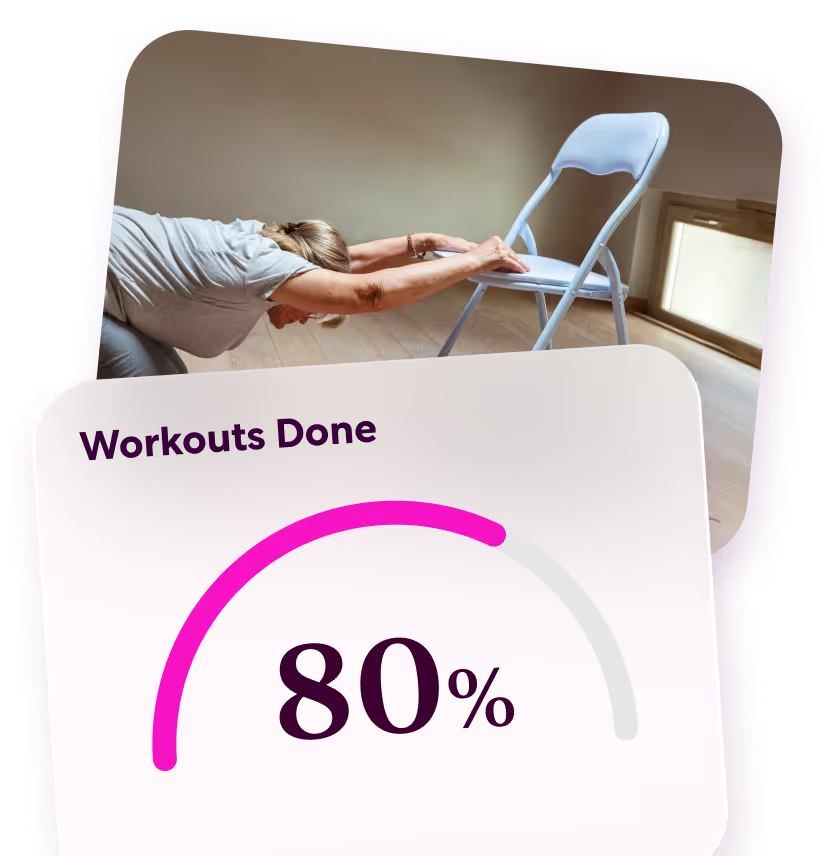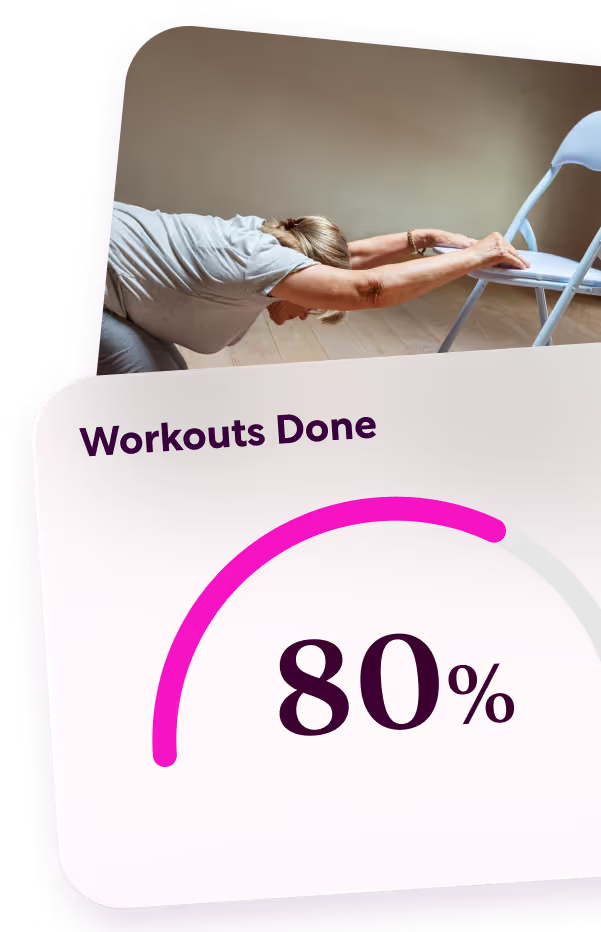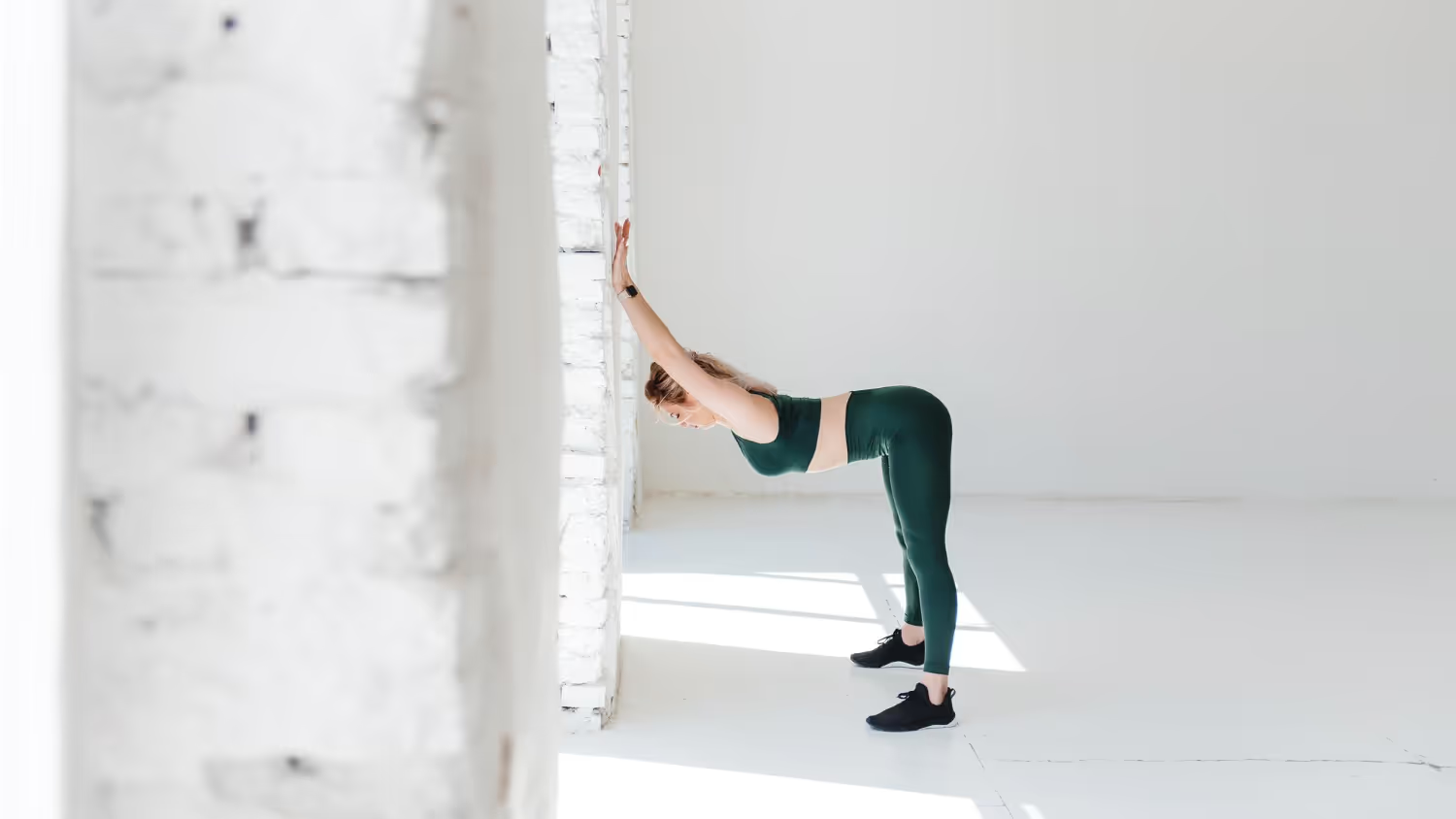Chair Yoga that meets you where you are.
Get your plan
Chair Yoga that meets you where you are.
Get your plan
Chair Yoga: Benefits and Essential Exercises for All Levels
What if an exercise existed where you could enjoy all the benefits of yoga, but instead of a mat, all you need is a sturdy chair?
Chair yoga is a beginner-friendly variant of yoga that offers a safe, supportive way to explore the benefits of yoga without the time commitment usually associated with this form of exercise. While not primarily for weight loss, chair yoga can support overall health and complement other fitness activities.
Whether you're a senior looking to maintain mobility, an office worker seeking relief from desk-bound tension, or someone managing physical limitations, this modified version of traditional yoga makes yoga accessible.
Getting Started with Chair Yoga

Yoga doesn't require fancy equipment or standing poses. Chair yoga brings gentle movement and mindfulness right where you sit. This accessible practice is for everyone, whether you’re going through menopause, looking to lose weight, or just want to start being more active.
What Is Chair Yoga and How Does It Work?
Think of chair yoga as your friendly introduction to fitness. With constant practice, you'll discover how small movements can significantly change how your body feels and functions. It’s amazing how much tension the simple stretches and gentle twists release while also helping you build strength.
Chair yoga eliminates the need to get down on a yoga mat or try to maintain tricky balancing poses. The chair acts like a portable prop that assists with alignment and balance, allowing you to remain safe and seated while moving through poses.
What’s the main difference between Char Yoga and other types of Yoga?
Picture yourself seated comfortably while stretching your arms overhead. That simple movement marks your first step into chair yoga. Unlike traditional yoga classes that require mats and floor poses, chair yoga transforms any seat, provided that it’s stable and sturdy, into your personal exercise space.
This practice is perfectly suited for beginners, office workers, older women, women recovering from injuries, and women who want gentle exercise.
How Effective Is Chair Yoga for Health?
Chair yoga’s benefits shouldn’t be too different from traditional yoga's. This means it’s good for weight loss, mental health, flexibility, strength, and menopause-related joint pain. Even short sessions can boost energy levels and improve circulation throughout your body, which is particularly important if you have a sedentary lifestyle.
Chair Yoga for Weight Management and Mobility
Daily movement matters more than intense workouts for maintaining a healthy weight. Chair yoga offers manageable exercise sessions you can easily fit into your busy schedule. While our body burns calories while performing seated exercises, they don’t drain your energy as much or put stress on your joints, so you don’t have to worry about extended recovery periods or the risk of injury.
As a bonus, simple twists and stretches help loosen tight muscles around your spine and hips. Consistent practice will increase your range of motion naturally.
Benefits of Chair Yoga

Improved Core Strength and Stability
Chair yoga's gentle stretches melt away stiffness. Your body gradually gains more range of motion without forcing or straining, easing that morning stiffness that has troubled you for years.
Enhanced Flexibility and Range of Motion
The chair provides a stable base to explore a greater range of motion while enjoying a decreased risk of muscle strains and exercise-related injuries.
Joint-Friendly, Low-Impact Exercise
The practice allows movement exploration within pain-free ranges, perfect for people with arthritis or joint sensitivity. It leaves your joints healthy and injury-free with minimal added stress or tension.
Better Posture and Alignment
Chair yoga teaches awareness of proper spinal alignment, gradually and naturally improving posture through carefully selected seated positions. Office workers particularly benefit from chair yoga's postural focus. Quick stretches throughout workdays help maintain proper alignment, and your spine stays healthier through regular movement breaks.
Mental Benefits: Reduced Stress and Improved Focus
Chair yoga combines movement with mindfulness. The deep breathing paired with gentle poses helps quiet racing thoughts, teaching you how to stay in the moment instead of worrying about what has already happened or what will happen.
Following breathing cues while doing poses also sharpens your mental focus while helping fight anxiety and depression by flooding your brain with feel-good chemicals.
Accessible for All Ages and Fitness Levels
With chair yoga, no previous yoga is necessary. All it requires is a willingness to try something new. Adjustments and variations are available for each pose based on your individual needs, allowing you to participate at your level.
Chair yoga is particularly beneficial for older women who need to maintain strength, flexibility, and social interaction—Reverse Health is perfect for connecting you to other like-minded women—as they age.
Regardless of age, constant practice will help you gain confidence in your physical abilities.
Essential Chair Yoga Poses for Beginners

Seated Mountain Pose
The mountain pose creates a foundation for proper seated alignment. Begin by sitting toward the chair edge with feet flat on the floor. Let your spine lengthen naturally while your shoulders relax downward.
Breathe deeply while maintaining an upright posture. Your ribcage lifts slightly with each inhale. Practice this foundational pose between other movements.
Regular practice of mountain pose improves overall posture. This simple position teaches your body proper alignment. More often than not, this will serve as your base pose during your chair yoga sessions.
Chair Cat-Cow Stretch
Start by sitting tall toward the chair's front edge. Place both feet flat on the floor hip-width apart. Rest hands on knees or thighs.
Take a deep breath while you lift your chest, looking slightly up. Let your belly move forward as you raise your spine into a slight arch. Exhale while rounding your spine and dropping your chin toward your chest. Repeat these movements slowly 5-10 times.
Seated Forward Bend
Stretch your back and hamstring muscles with this exercise.
Start by sitting tall with feet planted firmly on the floor. Fold your upper body forward slowly while maintaining proper breathing. Keep your knees in a slight bend, leaving your back feeling a gentle stretch without straining it. Listen to your body signals throughout the exercise.
Seated Spinal Twist
Begin in your tall seated position—sit up straight with your shoulders back. Inhale while lengthening your spine upward. Exhale while turning gently toward the right. Your hands can hold the chair back or rest on the seat.
Hold each twist for 3-5 breaths before returning to the center. Repeat on your left side. Remember to keep movements gentle without forcing.
Seated Warrior Pose
The warrior pose builds strength even when you’re seated.
You can start by leaving one leg extended as you sit near the edge of the chair. Keep the leg strong, but don’t lock it. Your upper body should remain tall during pose holds. Constant practice will help build leg strength and core stability.
Tips for Beginners

Focus on Breath and Relaxation
Start each session with deep, mindful breaths, teaching your body how to breathe better.
A common mistake by beginners is rushing through breathing exercises. This is wrong. One of the goals of yoga is to teach you to stay present in the moment. The only way you can do that is to develop better breathing habits until they become natural to you. Once you’ve achieved a more natural breathing flow, your muscles will become more fully relaxed through each exercise.
Start with Simple Movements
Speaking of rushing, start simple. The basic movements build the necessary foundation for advanced poses.
Begin with basic stretches and gentle twists as your body adapts to new movement patterns. Practice basic poses until they feel comfortable and you become more confident. The more advanced poses are a natural progression after you build a strong foundation while minimizing the risk of injury and guaranteeing steady progress.
Use a Stable Chair with No Wheels
Regular dining chairs work well for practice as long as they’re sturdy. Your chair should allow your feet to reach the floor for safety and comfort. If possible, avoid using chairs with arms. You can move better with open-sided seats.
Kitchen or dining chairs work well for this purpose. The chair back provides the necessary support and often does not have soft cushions and wheels.
Practice Regularly for Best Results
Consistent and daily short practices are the best way to create lasting positive changes.
Schedule your practice times around your routines. Eventually, the benefits will accumulate. But don’t be too ambitious. Keep your practice times short and realistic. Regular short sessions beat sporadic and inconsistent long ones.
Tips for Advanced Chair Yoga Practitioners

Add Resistance Bands for Strength
Add gentle resistance using light weights or bands to gain strength and build muscle. But choose bands that match your strength level. Don’t force resistance unless you can control your movements while using the bands.
Incorporate Standing Chair-Assisted Poses
Standing poses such as the Chair Mountain Pose, and the Chair Warrior Pose are excellent ways to build balance while staying safe and supported. Instead of being seated, however, you’ll do them standing up with your chair in reach for safety and stability.
Eventually, you can transition into independent standing and even more traditional yoga poses as your body adapts through regular practice and your balance improves.
Try Chair Yoga Flows for Flexibility and Endurance
Movement combinations and creative flows are the next step in your yoga practice.
After learning individual poses, learn flow sequences and connected movements that match your comfort level as your body gains endurance. Let your breathing guide your movement.
Practice Mindful Meditation with Poses
One of the biggest differences between yoga and Pilates is the mindfulness focus in the former.
Meditation is an integral part of yoga. The short mindful moments in between poses are part of the process. With regular practice, your awareness grows and improves. Combined with proper breathing, you become more focused and aware of your body, which leads to a stronger mind-body connection.
Setting Up Your Space for Chair Yoga at Home
Pick a quiet spot with enough room around your chair, good lighting, and a comfortable temperature. If possible, remove distractions before you start, but have water nearby to stay hydrated. Finally, wear comfortable clothing that allows easy movement and add a non-slip surface or yoga mat under the chair.
Once you have the area set, it’s time to turn it into a routine. Start with 10-15 minutes before gradually increasing the duration.
Morning sessions energize your day ahead, and evening practice helps release daily tension. Do both if you can. But it’s best to choose times that fit naturally into your schedule.
Recap: About Chair Yoga
From stress relief to improved flexibility, better balance and stability, and a way to jumpstart your fitness journey, chair yoga is your first step—or, in this case, first breath—towards lasting, positive changes in your mind and body.
Begin with the basics, progress at your own pace, and enjoy this investment in your overall health and quality of life.
Chair Yoga that meets you where you are.
Get your plan
Sources
FAQs
What is chair yoga, and who can benefit from it?
Chair yoga is a gentle form of yoga that uses a chair for support, making it accessible for all fitness levels, especially beginners, seniors, and those with mobility challenges. It allows people to enjoy the benefits of yoga without the need for advanced flexibility or balance, making it ideal for anyone looking to improve their well-being.
What are the main benefits of chair yoga?
Chair yoga offers numerous benefits, including improved flexibility, balance, posture, and mental clarity. It’s also known to reduce stress, increase circulation, and promote relaxation, making it a great option for those looking to maintain or enhance their physical and mental health gently.
Can chair yoga help with weight loss?
Yes, chair yoga can aid in weight loss by increasing physical activity and building muscle strength, which boosts metabolism. It also encourages mindful breathing and body awareness, which can lead to better eating habits and stress management—important factors for healthy weight management.
What are some essential chair yoga exercises for beginners?
Some basic chair yoga exercises include seated cat-cow stretches for spine flexibility, seated twists for improved digestion, forward bends to stretch the lower back, and ankle rolls to enhance circulation. These exercises can be easily modified and are a great starting point for beginners.
How often should I practice chair yoga to see results?
Practicing chair yoga at least 2-3 times a week can help you see noticeable improvements in flexibility, balance, and relaxation. Even short, regular sessions can make a difference, and as you progress, you may increase the duration and frequency to enhance the benefits further.







